Phone: 303.945.2490 Fax: 866.592.6911 Email: [email protected]
621 Kalamath St. Ste 175, Denver, CO 80204
JOIN US FOR A 2024 HEALING ADVENTURE!
FD Lead Staff, Sarah “Devo” Tescher has spent years of her life exploring the outdoors and empowering others to do the same. When she’s not Out Living It with First Descents participants, Devo runs Durango Devo, a youth cycling development program in her hometown of Durango, Colorado. From two year-olds on pushbikes to 18 year-old national champion riders, Devo is committed to coaching, mentoring and improving access to mountain biking for folks of all ages and backgrounds. Most recently, Devo teamed up with local riders Scott Nydam and Jon Yazzie of the Navajo Nation to create more opportunities for riding and skill building in the Navajo Nation (NN).
We chatted with Devo, Jon and Scott to learn more about improving access to outdoor sports, breaking barriers to entry, and building innovative program models to motivate riders for years to come. Here’s what they had to say.
All photos courtesy of Shaun Price.
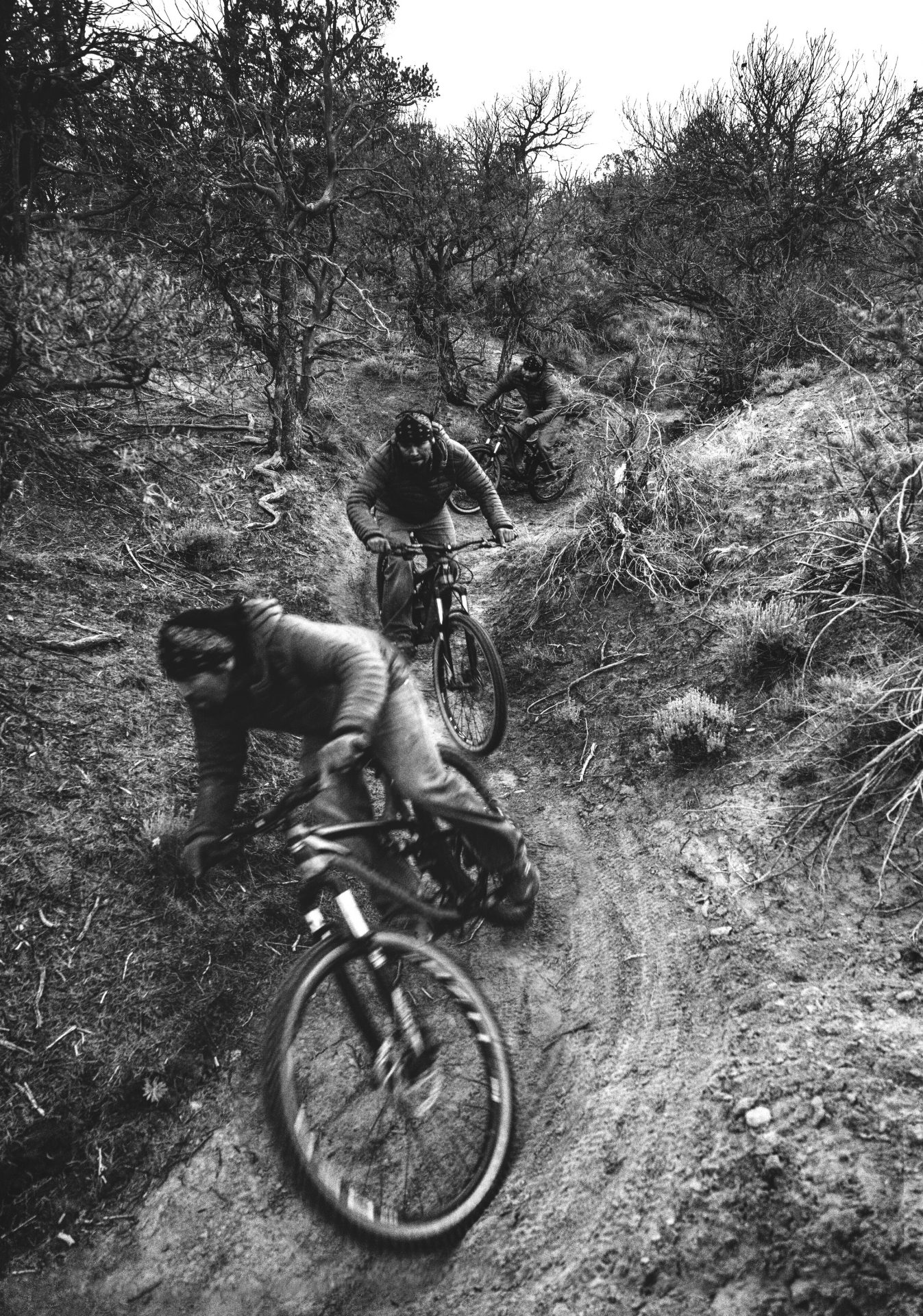
FD: Thanks for taking the time to fill us in on your latest adventures, and the new mountain biking program you’re collaborating on with the Navajo Nation. We’re excited to learn more. But first, can you tell us what inspired this program and how did you get involved?
Devo: Oh gosh, I’ve been getting kids on bikes for over 20 years, so just about every day for me is about getting people outside smiling. It upsets me that not everyone has the same accessibility to the outdoors that I have. I know so deeply the healing powers of time spent outside, and I want people to experience that as well as be stewards of the land. When I started Devo (a junior cycling program in Durango, not just my FD nickname), it was important to me that I had as many scholarships as possible so that kids had access to riding bikes. Now that I am providing seminars and consulting for other junior cycling programs to get more kids on bikes, I am still searching for ways to help programs become more accessible and inclusive. I find that most people who want to coach, teach or be a part of a non profit organization want to help people and be inclusive, but they don’t always know how. Honestly, being a white female, I don’t think I always know how.
Anyways, I met Scott and Vincent when they “went through” a seminar I created. It was obvious to me their passion for getting kids on bikes was really strong, and I just wanted to be a part of that. So, this past Fall I went to help with a kids bike rodeo and bike build in a small community called Black Mesa (in a rain storm and my van only fell off the road once as the roads on the NN are not for the faint at heart). Soon after, I was contacted by a foundation called Catena Foundation to partner and find more ways to work with NN and help get more kiddos on bikes. Their grant has funded programs and staff to continue working with the Navajo Nation. I’m just so thrilled that they reached out to help!
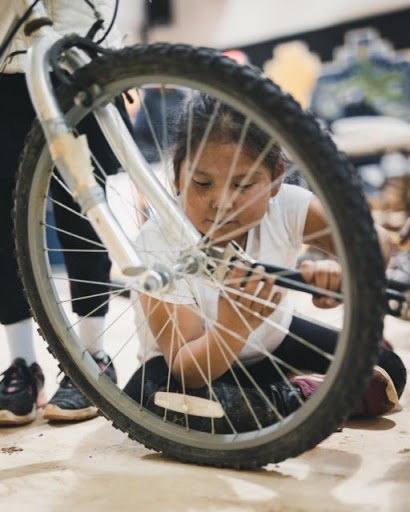
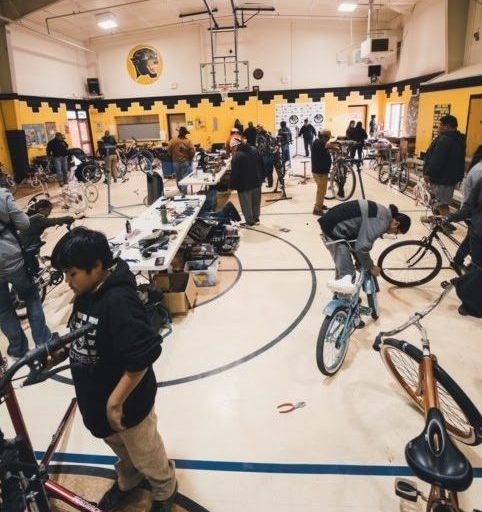
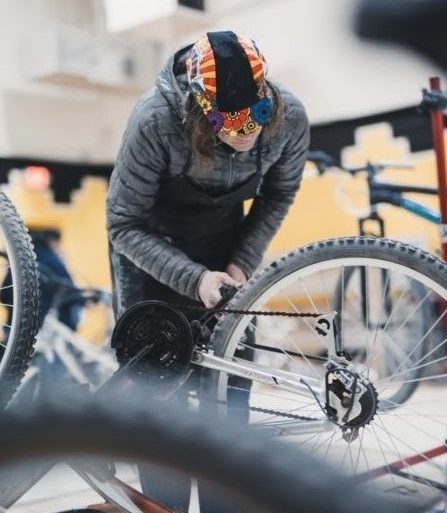
FD: It sounds like an awesome program model. Can you tell us a little bit more about the plans you have to develop these opportunities and adventure programs with the NN?
Devo: The plan is to hold 36 bike rodeos and bike builds in 2020 all over the NN. Through my time down there, and seeing how far apart Navajo communities are, I helped create a plan for a bike program that goes to them versus them coming to the bike program. We decided that a mobile ride center was the best way to access the kids. Also, the chapter houses on the NN are really the ones who make decisions for the people, so going to them directly and working directly with the individual community members seemed like the way to go. Think of an ice cream truck meets a community Bingo night, and that is what we want the mobile ride center to feel like for each community.
“Think of an ice cream truck meets a community Bingo night, and that is what we want the mobile ride center to feel like for each community.”
Another important part of the plan is for the program to be led by Navajo mechanics and coaches. I have met some amazing coaches, riders and mechanics on the NN and what better way to reach the kids on the Nation than to have their own people lead them on rides or fixing their bikes! It is also important to note that the bike build curriculum is focused on education and the goal would be for folks to have the knowledge to work on their own bikes, create their own trails, and ride with their own kids!
FD: That’s such an impactful part of your programming model! Jon, as a rider, coach and member of the Navajo Nation can you tell us a bit about the NN community, and the way that you spend time outside?
Jon: I feel like Navajo communities are tight knit. Some examples of that are the multi generational homes, family events, and other social gatherings. A huge percentage of outdoor experience or camping are tied to ceremonies or livestock chores. Camping is only a tool to help achieve those goals. Most families don’t just camp to camp. If they do, it’s usually off the reservation for easier access to fishing, hiking, etc.
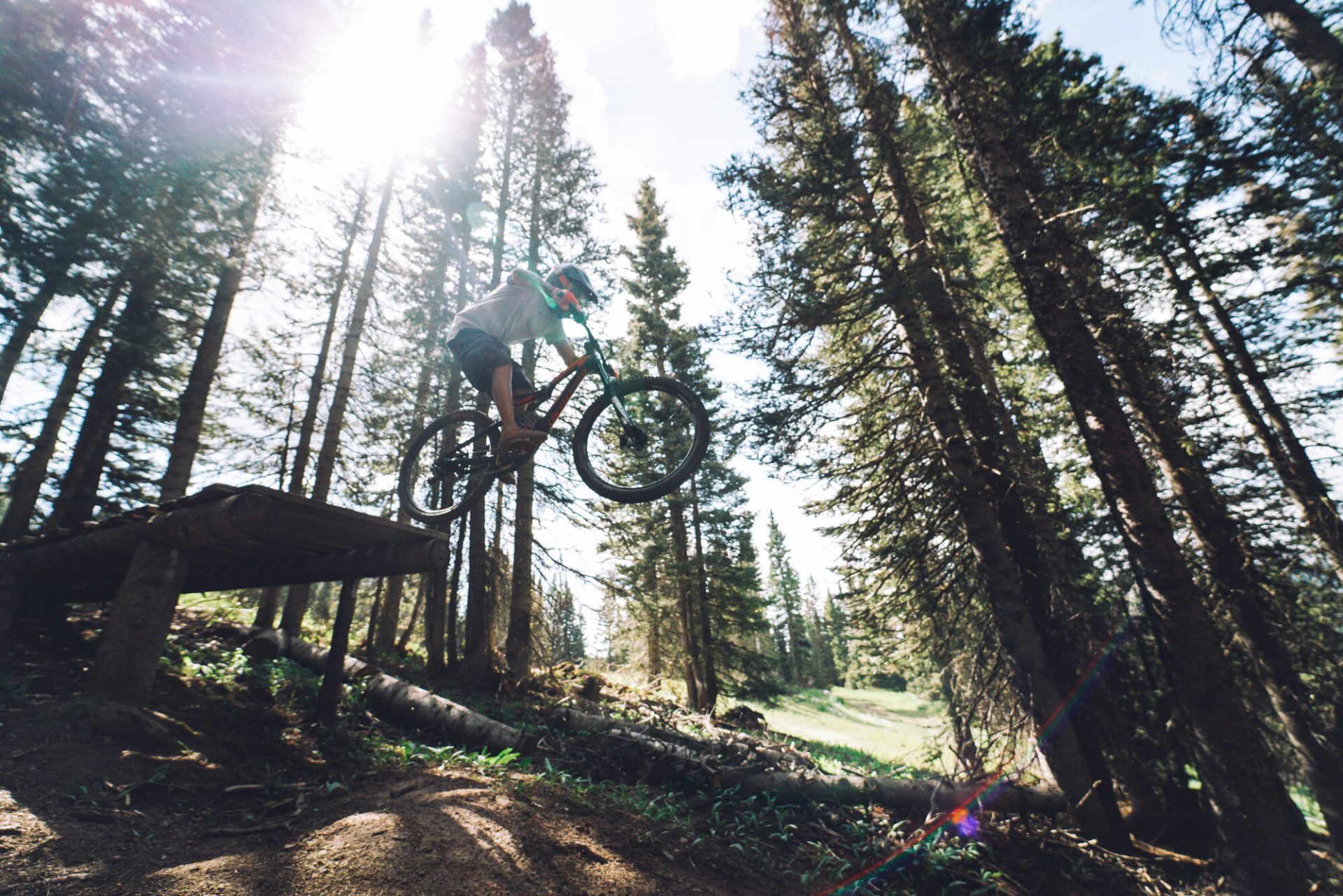
FD: Right on. Can you describe what outdoor adventure opportunities are currently available to the Navajo Nation in your area? What are some of the barriers to entry that you’re working to address?
Jon: Currently most outdoor adventures on Navajo usually involve running events, and just recently a few bike races/rides. Some schools have adventure based clubs that do rafting and a little bit of hiking, but nothing with biking. This is usually based on the experience of their teachers/clubs sponsors and the availability of funding. I believe one of the biggest barriers is lack of access to land on the Navajo nation for Outdoor recreation. There is a lengthy process to acquiring an area for outdoor recreation which ends up discouraging clubs or individuals from pursuing, so clubs often times take their youth to places off the reservations. Some Navajo communities have trail initiatives in place and are building multi use trails, but again that requires the right person who can coordinate all the steps to withdraw land with local chapters (government). A big barrier may also be the traditional views of Navajos. Older teachings say that the earth is mother and isn’t for riding, hiking or tearing up, so many land proposals for recreation end up stopping here.
FD: That makes sense. Bringing the community into the fold in these conversations is so important. Looking ahead, what will it take to make mountain biking more equitable and accessible to the Navajo Nation?
Jon: To make mountain biking more equitable, it would take more visible riders, and more programs that offer bikes for people to ride and equipment to get started. Local Indian Health Service (IHS) has biking programs, but their bikes end up in long term storage because lack of know how to keep them maintained. And 99% of the time it is usually simple things like flat tires and brake issues.
FD: So, it’s not just about developing the programs, but also providing infrastructure, maintaining bikes and building the skills to keep these resources available. Scott, your pursuits with Silver Stallion Bicycle and Coffee Works have examined these issues too. What are your thoughts?
Scott: We’ve seen and realized through Covid-19 (on so many other various levels with so many other various things) how essential the bike and bike shops are to society. Across the entire 27k square mile Navajo Nation there is not one single bike shop. If there, then, is a systemic injustice of an essential item of life not being made available to all, then how or why is that?
There’s likely gotta be a systems approach toward addressing it, in this case, on every level. I think that heavy lifting needs to be done by the industry – so that things roll down hill toward projects like ours and in the region we’re doing it . . . otherwise it is and will be an uphill climb the whole time, and, I keep saying, some things gotta roll down hill.
Along with what Jon mentioned about having more visible riders, everyone keeps talking about access being the issue. But I think that stops short of the real challenge, and that’s of approachability. . . for young or old.
“everyone keeps talking about access being the issue. But I think that stops short of the real challenge...”
But for kids, I think having more ridership has to do simply with having mentors and other riders that look like – perhaps have the same color skin, as they do.
FD: That approachability piece in the outdoor industry is huge. So many outdoor opportunities feel foreign or unapproachable to folks with cancer or MS, or to folks who don’t have easy access in their community, like the NN.
Scott: There are so many blank spot non-opportunities on the Reservation when it comes to having what it takes to make the bike to be part of someone’s life, for their whole life long. I keep saying, we need to build Wimbledon around the tennis racket.
FD: Yeah – I love that you emphasized the “life long” element. It’s about more than a one-off experience, it’s how can we begin providing access to try something not only once, but the opportunity to engage with it as a lifestyle. We’re thinking about that a lot at First Descents, with our Out Living It Project. These are important, challenging questions to keep asking in new arenas, no doubt.
FD: Devo, how do you think what you learn from this work will inform your future as a First Descents’ lead staff?
Devo: Well, I think that what I have learned is that cultural oppression and racism runs so deep and that this hereditary trauma from oppression can affect a person’s approach to relationships, trust, and willingness to try new things (such as an FD trip). I suppose I walk away with even more awareness and respect for people who decide to go on FD trips and who are a person of color or coming from a culture or identity that historically has been repressed or has seen horrible violence against them. I also have a deeper understanding of the importance of community and feeling safe within that community.
FD: Building that sense of understanding is important to building safe spaces to explore outdoors. What space do you hope to offer to the communities you lead and work with, from FD groups to Navajo Nation riders, and beyond?
Devo: Hope to offer…I suppose I enter a place or an organization or an FD trip and just try to create an environment whereby we all grow, we all love being outside and we all leave feeling a part of a community that supports us. I don’t really see myself as a lead guide nor lead in the traditional sense. Rather, for most situations, be that coach, FD trips, or in consulting, I just listen to what kids and people are saying and follow their lead to collectively create an environment whereby we all are stoked to be with each other outside and feel safe yet challenged.
FD: Couldn’t have said it better ourselves. Thanks for continuing to build these safe, challenging, adventurous and supportive spaces for FD, the Navajo Nation, and the other riders you coach. We love the work you’re doing, and appreciate all three of you taking the time to chat with us today!
All photos property of Shaun Price. For more of Shaun’s incredible work, check out his instagram or personal website.
To learn more about Jon Yazzie and his bike packing programs at Dziltaah Adventures visit this page.
To learn more about Silver Stallion and Scott Nydam’s work, take a look at this page.
For information on Durango Devo seminars, workshops, coaching and more check out Devo’s work.